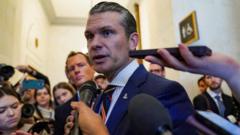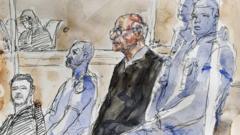As the confirmation hearings commence, nominees such as Pete Hegseth and Kristi Noem are poised to face tough scrutiny from both sides of the aisle regarding their past actions and policy positions.
Trump's Nominees Face Tough Questions Ahead of Senate Hearings

Trump's Nominees Face Tough Questions Ahead of Senate Hearings
Senators prepare for a challenging week as they question Trump's key nominees for high-level positions.
In the upcoming week, some of Donald Trump's key nominees will undergo rigorous questioning by senators as they vie for confirmation to high-profile government positions. This pivotal moment marks the first public opportunity for senators to scrutinize Trump's more contentious picks in what could be a contentious process. A series of hearings will assess their qualifications, with confirmation requiring a simple majority vote in the Republican-controlled Senate—meaning just three defections could halt a nominee's appointment.
Pete Hegseth, nominated for Defense Secretary, is anticipated to be one of the most discussed nominees during his hearing. The former Fox News host and military veteran faces inquiries regarding his management experience, allegations of heavy drinking, and historical opposition to women in combat. Significant attention may also be drawn to a past sexual assault claim, which Hegseth denies, maintaining it was consensual, and later resulted in a financial settlement.
Kristi Noem, nominated for Homeland Security Secretary, is expected to defend her ability to implement Trump's ambitious immigration policy, which includes mass deportations. She may confront challenging questions concerning the feasibility of such proposals and other key immigration reforms, including the controversial issue of birthright citizenship.
On the foreign policy front, Marco Rubio's nomination for Secretary of State may test his alignment with Trump’s views, particularly relating to U.S. support for Ukraine amidst ongoing conflict. Unlike his previous confrontations with nominees, Rubio is anticipated to navigate this confirmation process with relative ease despite facing pointed questions about foreign policy.
Howard Lutnick, eyeing the Commerce Secretary role, might have to justify Trump's proposed tariffs during his upcoming hearing. Discussion will likely center on the economic ramifications of these import taxes and their impact on American consumers, contrasting with perspectives from various economists and business leaders.
Tulsi Gabbard, nominee for National Intelligence Director, risks backlash over her past commentaries concerning U.S. military engagements in confronted regions like Syria and Russia. Pending the completion of background checks, her hearing may delve into these earlier statements and their implications for U.S. intelligence operations.
Robert F. Kennedy Jr., designated as the Health and Human Services Secretary, could face intense scrutiny given his lack of medical qualifications and controversial stances on vaccine safety. As he defends his health policy positions, Kennedy will navigate between scientific consensus and his previously held views.
Finally, Kash Patel, selected as the new FBI Director, confronts skepticism about his qualifications. Critics note concerns over his commitment to reform the agency amidst contentious remarks about seeking retribution against perceived political adversaries. Nevertheless, some Republicans and Trump supporters praise his extensive legal and national security background.
As the hearings unfold, senators will pose difficult questions, weighing Trump's nominees' history against their potential roles in the administration. The outcomes may shape not only the future of Trump's presidency but also broader U.S. policies.























